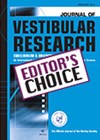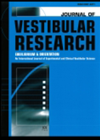
Journal Reviews
Obstructive sleep apnoea in common vestibular disorders
The importance of getting a good night’s sleep is often acknowledged but may be particularly difficult to achieve for those with obstructive sleep apnoea (OSA). In addition to high blood pressure, increased risk of stroke and depression, balance problems may...
How does the Dizziness Handicap Inventory (DHI) correlate with demographics and symptoms of patients?
The DHI is widely used to assess the self-perceived emotional, functional and physical disability in subjects with dizziness and balance problems. By studying the data of 568 patients retrospectively, the authors sought to determine the gender and age differences in...







